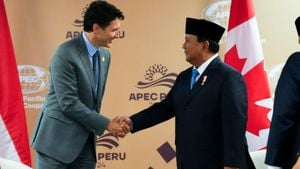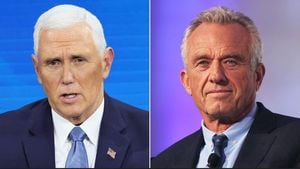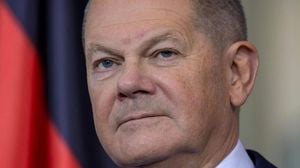The COP29 Climate Conference, currently taking place in Baku, Azerbaijan, has already sparked significant discussions and controversies surrounding its efficacy and direction. Tens of thousands of delegates from all corners of the globe converged for the annual summit, continuing the tradition set by the United Nations Framework Convention on Climate Change (UNFCCC), which has been operational since 1995, with the exception of the year 2020 due to the pandemic. The primary objective of these gatherings has always been to coordinate global responses to climate change, and track progress against established goals.
Despite its honorable mission, COP29 is facing mounting criticism, especially from environmental activists and certain political quarters, who argue the event has become ineffective and mired in greenwashing allegations. The sentiments expressed at protests highlight the frustration many feel about the conference, which they claim has become excessively cozy with fossil fuel interests. The phrase "virtue signaling" popped up repeatedly, reflecting how many believe the dialogue lacks genuine commitment to change.
One of the main focal points of discontent has been the minimal participation of major world leaders this year. Notably, both President Joe Biden and Vice President Kamala Harris chose to skip the conference, marking the second consecutive year one of the U.S. highest leaders has missed the event. Instead, senior climate policy advisor John Podesta was appointed to lead the U.S. delegation, joined by other significant figures within the administration like Energy Secretary Jennifer Granholm and Agriculture Secretary Tom Vilsack. Despite these appointments, many observers are left questioning the level of seriousness with which the U.S. government is approaching climate negotiations, especially as it relates to its historical role as a significant player on the world stage.
On the ground, the sixth day of the conference was marked by key highlights, including the appeal from the UN climate chief, Simon Stiell, to G20 leaders to prioritize climate action during their upcoming meeting. He cautioned delegates, stating the gap between negotiation points remained vast, and financial commitments for developing nations were still yet to be agreed upon. The pressure placed on this conference is immense, with many seeing it as pivotal for mobilizing serious financial support for climate initiatives worldwide.
Stiell emphasized, “The world is watching and expecting strong signals from the biggest economies.” He sought to galvanize momentum leading up to the G20 summit, imploring those countries, many of whom are the top polluters, to endorse concrete measures to combat climate change.
Among the considerable issues at COP29 is the demand from developing nations for significant annual funding—$1.3 trillion—to assist them in combating climate impact and transitioning to clean energy. Critics argue this figure is disproportionately high, especially when set against what developed nations, including the U.S. and the EU, currently contribute. The negotiations surrounding this financial aspect faced stalling points, particularly due to disputes over how to classify contributors and the nature of the funding itself. Developed nations want participating states like China and wealthier Gulf countries included on the donor list.
Activists and protesters, likely frustrated by perceived stagnation at the conference, organized demonstrations, demanding the end of fossil fuel financing. These demonstrations often included passionate calls for greater accountability and urgency from leaders, insisting their rhetoric must translate to actionable policies rather than merely performative acts.
One particularly broad-reaching protest dubbed this event as part of "a global day of action," amplifying voices from many different countries, all demanding more aggressive action against climate change. A significant number of activists charged through the COP29 venue, bearing signs and valid messages calling out the prioritization of fossil fuels within governmental budgets, as well as the slow progression toward clean energy mandates.
The Berlin-based organization 'Fridays for Future' led some of the most visible protests at the conference, once again targeting the established powers and calling for reforms aimed at reducing fossil fuel dependence. This intense outpouring of grassroots activism aimed to challenge the traditional dynamics of power, where often, the agenda is geared more toward market interests than solid environmental action.
Currently, the existing draft deal, stretching across 25 pages, continues to fluctuate with options and clauses, and closing the gap among negotiators remains challenging. Many fear if the world’s leaders do not heed the calls for action, the targets set by pivotal agreements such as the Paris Agreement will swiftly become only aspirational goals, unreachable before they can be implemented.
Besides political funding challenges, there are also broader concerns about the legitimacy of the conference itself. Critics argue there is significant misalignment between the conference's vision and the actions of its participants, especially when their countries continue to invest heavily in fossil fuels. Acknowledging the need for cleaner energy alternatives, yet continuing support for coal and oil extraction projects, is seen as hypocritical by many advocates.
One immediate concern is the missed opportunity for the conference to project unified action against climate change. Some analysts view the reluctance of major nation leaders to engage meaningfully as indicative of the overall credibility and influence of global climate discussions dwindling. This atmosphere of skepticism leads to questions about the conference’s future effectiveness—can it genuinely serve as the primary international platform for climate negotiations going forward?
While these mounting pressures weigh heavily on COP29, the coming days stand to either reaffirm or tarnish the credibility of this iconic climate conference. The G20 leaders' meeting may end up being a bellwether moment, indicating whether multilateral climate dialogue can still pivot toward serious commitments against climate change, or if the summit's whispers of potential action will simply fade away against the backdrop of entrenched fossil fuel interests.
Indeed, as the conference progresses, the world watches to see if COP29 can rise to the occasion, overcome its present obstacles, and deliver the substantial changes needed to forge pathways toward global sustainability. The stakes are high as activists, negotiators, and governments are reminded repeatedly: the time for action is not just now, it’s overdue.



